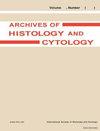可螯合铁(II)在暴露于缺血和再灌注的大鼠肾脏中产生,二价金属螯合剂2,2 '-双吡啶可减轻肾脏的急性缺血/再灌注损伤:灌注- perls和-Turnbull方法的组织化学研究。
Q4 Medicine
引用次数: 8
摘要
灌注- perls法和-Turnbull法加二氨基联苯胺强化法证实,大鼠肾缺血40min或缺血40min后再灌注60min的Fenton反应中,螯合铁(II)的生成和定位可催化细胞毒性羟基自由基(OH.)的生成。暴露于40 min缺血的肾脏显示铁(II)沉积物主要集中在皮质的较深的一半,在那里沉积物密集地充满了小管细胞核,在近曲小管(PCT)的细胞质中有少量。腔内突出或脱落的管状细胞核也充满了沉积物。经40min缺血/ 60min再灌注的肾脏显示铁(II)沉积物分布更广泛,包括皮质的大部分深度。此外,PCT管腔内可见大量脱落的、Fe (II)阳性的细胞核被少量细胞质包围,这些细胞似乎经历了凋亡细胞死亡,因为在40min缺血和24h再灌注的肾脏中,强烈扩张的、下游的、近端直小管的管腔被大量凋亡细胞阻塞。二价金属螯合剂2,2′-双吡啶预处理能有效抑制Fe (II)染色,减少肾缺血40 min /再灌注60 m时的脱落细胞数量,减少肾缺血40 min /再灌注24 h时的凋亡细胞数量。高活性OH的生成。Fe2+催化的Fenton反应在缺血/再灌注肾损伤中起重要作用。本文章由计算机程序翻译,如有差异,请以英文原文为准。
Chelatable Fe (II) is generated in the rat kidneys exposed to ischemia and reperfusion, and a divalent metal chelator, 2, 2'-dipyridyl, attenuates the acute ischemia/reperfusion-injury of the kidneys: a histochemical study by the perfusion-Perls and -Turnbull methods.
The perfusion-Perls and -Turnbull methods supplemented by diaminobenzidine intensification demonstrated the generation and localization of chelatable Fe (II) which can catalyze the generation of cytotoxic hydroxyl radicals (OH.) during the Fenton reaction in rat kidneys exposed to 40 min ischemia or 40 min-ischemia followed by 60 min-reperfusion. The kidneys exposed to 40 min-ischemia showed Fe (II)-deposits largely localized in the deeper half of the cortex, where the deposits densely filled the tubular cell nuclei, with a small amount of them in the cytoplasm of the proximal convoluted tubules (PCT). Intraluminally protruded or exfoliated tubular cell nuclei were also filled with the deposits. The kidneys subjected to 40 min-ischemia/ 60 min-reperfusion showed a more extensive distribution of Fe (II)-deposits, including most depths of the cortex. Furthermore, there were numerous exfoliated, Fe (II)-positive nuclei surrounded by a small amount of cytoplasm in the lumen of the PCT. These cells appeared to undergo apoptotic cell death since the lumen of strongly dilated, down-stream, proximal straight tubules were obstructed with numerous apoptotic cells in the kidneys exposed to 40 min-ischemia and 24 h-reperfusion. Pretreatment with a divalent metal chelator, 2, 2'-dipyridyl, effectively inhibited Fe (II)-staining, decreased the number of exfoliated cells in the kidneys with 40 min-ischemia/ 60 m-reperfusion, and decreased the number of apoptotic cells in the kidneys with 40 min-ischemia/24 h-reperfusion. The generation of highly reactive OH. during the Fe2+-catalyzed Fenton reaction was suggested to play a crucial role in ischemia/reperfusion-induced kidney injury.
求助全文
通过发布文献求助,成功后即可免费获取论文全文。
去求助
来源期刊

Archives of histology and cytology
生物-细胞生物学
自引率
0.00%
发文量
0
期刊介绍:
The Archives of Histology and Cytology provides prompt publication in English of original works on the histology and histochemistry of man and animals. The articles published are in principle restricted to studies on vertebrates, but investigations using invertebrates may be accepted when the intention and results present issues of common interest to vertebrate researchers. Pathological studies may also be accepted, if the observations and interpretations are deemed to contribute toward increasing knowledge of the normal features of the cells or tissues concerned. This journal will also publish reviews offering evaluations and critical interpretations of recent studies and theories.
 求助内容:
求助内容: 应助结果提醒方式:
应助结果提醒方式:


